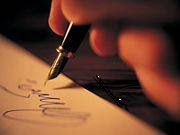
a person who, in the opinion of others, has heroic qualities or has performed a heroic act and is regarded as a model or ideal: (Dictionary.com)
-------------------
I mentioned in yesterday's posting (Champion) that I think the word hero gets overused at times. Sometimes, in the midst of an emotional moment or significant event, the media and others affix the title of hero to someone simply because they have survived a crisis. Thus, the little girl who falls down an old well shaft and is rescued after two days is called a "little hero."
Just what is it that she has done? Is she a hero because she fell down in the hole? Does the fact that she survived two days without dying make her a hero? You get my point. If I get any nastier about this I will begin receiving equally nasty comments. I don't mean to diminish the significance of the little girl's ordeal or the wondrous fact that she has been rescued. It's wonderful, and I know that her parents and family and friends are ecstatic...as well they should be.
But she's not a hero. She did nothing to deserve an award, or recognition for bravery or courageous action. She simply survived and lived to tell the story to her grandchildren.
The risky criticism of the use of this word comes when I launch into military examples. In many peoples' minds the very fact that a person serves in the military makes them a hero. My late brother-in-law served during the Korean War era as an aide in a mortuary in Boston. He transported bodies from the mortuary to the morgue. He never saw himself as doing anything heroic, and would have laughed at anyone's attempt to make him a hero. There are many service members who type letters, hand out uniforms, or take photographs for their branch of the military. Granted, they may find themselves in a combat position by quirk of fate, but for the most part their life in the military is rather mundane.
HEROES throw themselves on live grenades to save the lives of their buddies. They rescue elderly people from upper stories of buildings which are on fire. They swim out into the water to save the life of a boy who is cramping up and drowning. They serve in combat and stand in harm's way.
Some teachers who volunteer to teach in the most difficult schools in large cities may be heroes. I would say the same for some physicians who volunteer to serve with Doctors Without Borders and there are examples of missionaries in disease-infested, remote villages in Africa doing heroic acts.
I'm not writing this to dismiss the service of brave men and women who take on difficult tasks. I simply want to reserve the word hero for those who go above and beyond that which is expected of them.
Please wait while I don my flak jacket, bullet-proof vest, and helmet before posting this. I suspect my narrow definition of the word hero will be difficult for some of you to accept. Let the comments come!
Photo Credit: Stockphoto.com

For someone who dodged the draft by becomming a Professional Scholar you are very far off on the Military. Anyone who puts on the uniform of the Military is a hero. They may perform mundane tasks in the ordinary performance of their duties but they are all trained for what ever may occur. The military sees that you are able to print your one sided comments on this blog. I don't think you ever had a flak jacket, bullett proff vest or helment in your possession.
ReplyDeleteThe beauty of the word is that, by definition, it is open to interpretation by the user. Whether by virtue of going above and beyond the call of duty, surviving an extraordinary circumstance or doing well whatever it is that you do, heroes, like saints, come in all shapes and sizes. To me, anyone who wears a military uniform is a hero. Desk job or front-line soldier. I cannot fathom having the courage or strength to do so myself, therefore, I am in awe of and grateful to those who do.
ReplyDelete